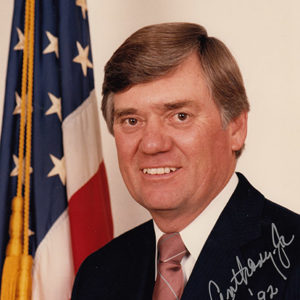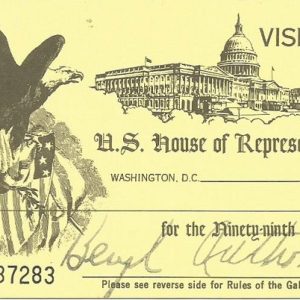calsfoundation@cals.org
Beryl Franklin Anthony Jr. (1938–)
Beryl Franklin Anthony Jr. is a long-time Arkansas public servant and an alumnus of the University of Arkansas (UA) in Fayetteville (Washington County). He served as a U.S. Representative from 1979 to 1993.
Beryl Franklin Anthony Jr. was born in El Dorado (Union County) on February 21, 1938, the son of Beryl Franklin Anthony Sr. and Oma Lee Roark Anthony. The Anthonys had founded the Anthony Forest Products Company, with Anthony Sr. as chairman. Anthony attended the Union County public schools; he graduated from El Dorado High School in 1956, and he earned BS and BA degrees from UA in 1961. He was also a member of the Sigma Chi Fraternity. In 1963, he earned a Juris Doctorate from the University of Arkansas School of Law. While a law student, he married Sheila Foster of Hope (Hempstead County); they have two children.
Anthony, who was admitted to the Arkansas bar in 1963, commenced practice in his hometown of El Dorado. From 1964 to 1965, he served as assistant attorney general to Attorney General Bruce Bennett, also from El Dorado. Then, he was appointed as deputy prosecuting attorney in Union County, serving from 1966 to 1970.
His first elected public office came in the 1970 election, when he won the Union County prosecuting attorney’s office, Thirteenth Judicial District; he held this position from 1971 to 1976. Anthony’s leadership in this position included improvements to the public prosecutorial system of Arkansas. While he served as president of the State Association of Prosecutors, he was instrumental in passing important legislative initiatives, such as reforming the Arkansas Criminal Code, improving the professionalism of prosecutors by funding a permanent position of executive director of prosecutors to oversee an ongoing program of training and other services to prosecutors and staff, and increasing the effectiveness of prosecutorial independence by turning the position of district prosecuting attorney into a full-time position. He joined his family’s business, Anthony Forest Products Co., as legal counsel in 1977, while he practiced law privately.
Anthony served as a delegate to Arkansas State Democratic conventions from 1964 to 1978. He ran for Congress initially to succeed Congressman Raymond H. Thornton Jr. when Thornton ran for Senator John L. McClellan’s seat. Anthony’s Democratic opponent was Winston Bryant of Malvern (Hot Spring County). Anthony emphasized his grassroots experience and his business experience. He was elected to Congress in 1978 and served from January 3, 1979, to January 3, 1993.
Vice president of his freshman class in Congress, Anthony was a founding member of the Sunbelt Coalition, a group that monitored the legislative impact upon southern states. After one term, he was appointed to the powerful House Ways and Means Committee. He also served on the Oversight and Trade Subcommittees as well as the Select Committee on Children, Youth, and Families. Anthony chaired the Democratic Congressional Campaign Committee from 1987 to 1991. He maintained a conservative voting record in Congress, similar to other southern Democrats.
As a member of the Ways and Means Committee, Anthony pursued a variety of important issues. In the 1980s, he played a major role in restructuring the Social Security trust fund. He championed legislation for improved rural healthcare, for which he was given awards by both the Arkansas Hospital Association and the American Hospital Association. In his last terms, he focused on international trade, working on the North American Free Trade Agreement (NAFTA) and on legislation for the General Agreement on Tariffs and Trade (GATT).
In 1988, Congress created the bipartisan Anthony Public Finance Commission—composed of mayors, governors, local government officials, and members of the finance community—to recommend legislation to help local governments finance the building of roads, schools, hospitals, and wastewater treatment facilities. The commission’s Arbitrage Relief Provision, enacted in 1989, substantially lessened the borrowing costs for infrastructure investments.
In 1992, Anthony lost the Democratic nomination for U.S. representative to Arkansas secretary of state William J. McCuen. McCuen received campaign funding from the National Rifle Association (NRA) due to Anthony’s support of legislation limiting so-called “Cop Killer” bullets. However, McCuen was in turn defeated by Republican Jay Dickey of Pine Bluff (Jefferson County) after a series of embarrassing incidents.
In January 1993, Anthony became a partner in the Washington DC office of Winston & Strawn. His clients have included major trade associations, governmental entities, and national and multinational corporations. On Capitol Hill and before the White House and executive agencies, Anthony works on matters involving healthcare reform, Superfund sites, trade relations with China, tax law changes affecting pharmaceuticals, and authorization and funding of major weapons systems. He was a member of the board of directors of Beverly Enterprises, which in 2006, before its acquisition by a private equity firm, operated 345 skilled nursing facilities, eighteen assisted living centers, and fifty-six hospice/home care centers.
As of 2013, Anthony and his wife reside in Palm City, Florida, and North Carolina.
For additional information:
“Beryl Franklin Anthony Jr.” Biographical Directory of the United States Congress. http://bioguide.congress.gov/scripts/biodisplay.pl?index=A000213 (accessed November 3, 2021).
Kay C. Goss
Alexandria, Virginia
 Divergent Prosperity and the Arc of Reform, 1968–2022
Divergent Prosperity and the Arc of Reform, 1968–2022 Beryl Anthony
Beryl Anthony  Gallery Pass
Gallery Pass 




Comments
No comments on this entry yet.